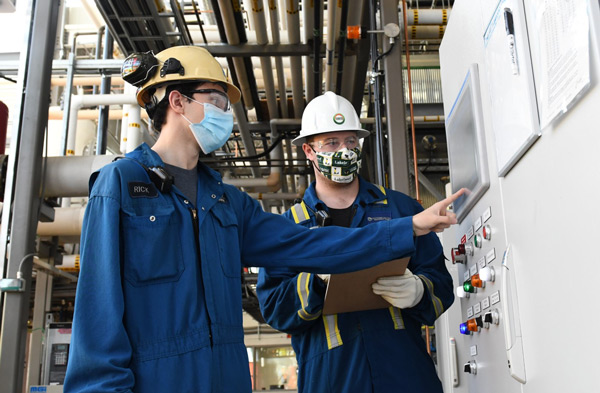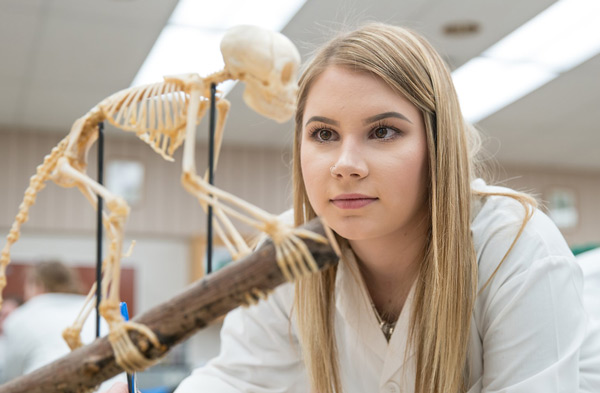
Alberta’s colleges are ready to respond to the Alberta 2030: Building Skills for Jobs strategy by continuing to provide adaptable, relevant, hands-on training that prepares students to support Alberta’s employers and economy. The strategy, released by the Ministry of Advanced Education on Thursday, supports the work already being done by the province’s 11 Comprehensive Community Colleges.
Located in all regions of the province, Alberta’s colleges provide access to education and a variety of educational opportunities to all Albertans. Alberta’s colleges work closely with industry partners to ensure their applied degree, diploma, certificate and apprenticeship programs provide both the technical skills and the employability competencies needed to prepare students to enjoy fulfilling lives and careers.
“The Alberta 2030 strategy allows us to reflect on the work already being done to support students and industry, and to explore opportunities for increased support and collaboration,” says Dr. Paula Burns, Lethbridge College President and CEO. “We are proud of our industry-driven education and applied research, and we know we are well-positioned to deliver on the province’s post-secondary needs now and into the future.”
Alberta’s colleges are committed to making post-secondary education affordable and accessible for all Albertans at all stages of their post-secondary journey. From providing dual credit programming that allows high school students to begin building employable skills, to upgrading opportunities that prepare students to enter the post-secondary system, to creating microcredentials that help experienced workers upskill or re-skill to meet industry demand, Alberta’s colleges take education beyond traditional programming by ensuring students have access to high quality post-secondary opportunities.

Lakeland College challenges every student to go beyond the classroom and to be part of hands-on learning opportunities that deliver real-world results. Heavy oil power engineering students put their education into action in Lakeland’s state-of-the-art Energy Centre at the Lloydminster campus.
Alberta’s colleges are committed to making post-secondary education affordable and accessible for all Albertans at all stages of their post-secondary journey. From providing dual credit programming that allows high school students to begin building employable skills, to upgrading opportunities that prepare students to enter the post-secondary system, to creating microcredentials that help experienced workers upskill or re-skill to meet industry demand, Alberta’s colleges take education beyond traditional programming by ensuring students have access to high quality post-secondary opportunities.
“Through practicums, co-ops, apprenticeships, and advisory boards, Lakeland enthusiastically partners with businesses and organizations to ensure our students graduate with the skills to meet employers’ needs,” says Dr. Alice Wainwright-Stewart, Lakeland College President and CEO. “Our priority has always been to go beyond the classroom to offer our students work-integrated learning opportunities that set them up for success in the real world. We are excited to work with the Government of Alberta to strengthen and streamline this process.”
Hands-on training and industry involvement have long been a staple of education in Alberta’s colleges. Colleges work with industry advisory councils to ensure students are learning the skills they need to enter industry and begin successful and fulfilling careers. Those skills are reinforced by hands-on practicums and placements present in the vast majority of Alberta’s college programs. Investment in industry-standard and emerging technologies ensure students are prepared from the first day they enter a workplace environment.

More students interested in studying biological sciences will be able to do so at Red Deer College. RDC's new Bachelor of Science in Biological Sciences is among the new programs being offered at Alberta's colleges this fall.
In addition to training workers, Alberta’s colleges also play a key role in solving industry challenges through applied research and innovative partnerships. Three Alberta colleges ranked among Canada’s top 50 research colleges in 2020, as institutions attract top researchers from around the world and provide students the opportunity to be involved in meaningful, industry-driven research. Four of Alberta’s colleges host Technology Access Centres, which support small- and medium-sized enterprises by providing fee-for-service applied research and innovation services to solve industry challenges and provide specialized training.
“Alberta's colleges play a critical role in the prosperity of our province,” says Stuart Cullum, Olds College President. “Through industry-focused education, training and applied research, we are delivering the skilled workforce and innovative advancements that Alberta’s economy needs.”
Alberta’s colleges welcome the opportunity to continue working with the Ministry of Advanced Education to collaboratively support students, industry and communities throughout the province.